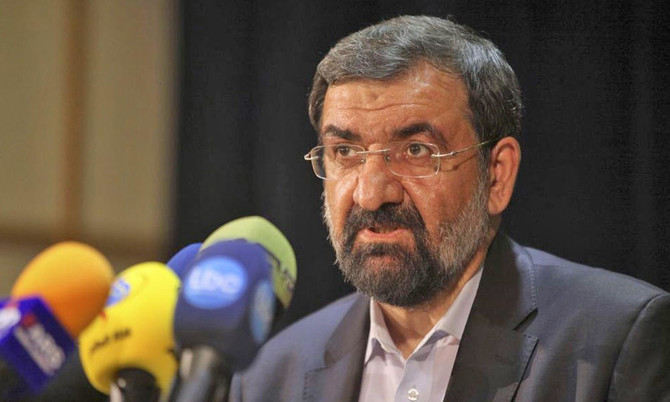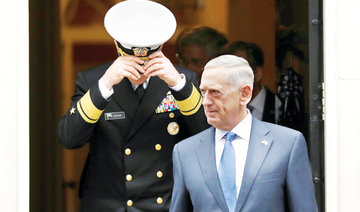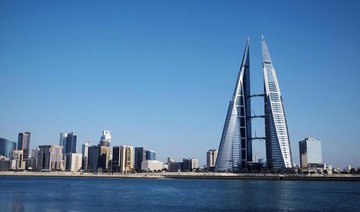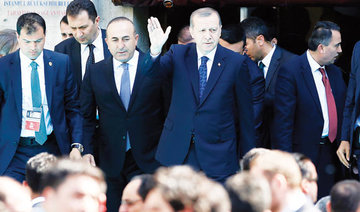TEHRAN: Iran’s hard-liners are hoping they can benefit from the election of US President Donald Trump, arguing that their own country needs a tougher leader to stand up to an American president whose administration has put the Islamic Republic “on notice.”
They say it’s time for a “revolutionary diplomacy” to confront the US after four years of a more conciliatory policy under moderate incumbent President Hassan Rouhani.
Hard-liners feel energized by the Trump administration’s repeated criticism of the landmark 2015 nuclear deal. The agreement found little support among the group, who feel Iran gave too much away in exchange for too little in the way of sanctions relief.
The US president’s tough talk on Iran plays into hard-liners’ hands too, reinforcing anti-American sentiments they can use to rally their base.
A group of hard-liners banded together late last year to form the Popular Front of Islamic Revolution Forces, which is assessing more than a dozen potential candidates. But with less than two months to go before the May 19 election, they have yet to settle on one to run against Rouhani.
One potential candidate, Mohsen Rezaei, a former chief of the elite Revolutionary Guard, has lashed out at the administration for lacking revolutionary spirit — tough words in a country that prizes the heroes of the 1979 Islamic Revolution that created the current governmental system.
“A group (of officials) has become hopeless and tired while trying to find a prescription for problems outside the revolutionary framework,” he said.
A lack of reliable polling in Iran makes it difficult to gauge how the election could play out, particularly given that no hopefuls have formally declared their candidacies yet.
But Tehran-based political analyst Soroush Farhadi said Trump’s stance on Iran could bode ill for Rouhani’s chances because it gives hard-liners a way to denounce his foreign policy of outreach and negotiation with the West and regional rivals.
Earlier in March, the current chief of the Guard, Mohammad Ali Jafari, warned that an “un-revolutionary viewpoint” that had taken hold in recent years was the greatest danger facing Iran.
The daily Javan, which is affiliated with the Guard, has meanwhile criticized the Rouhani administration for choosing “smile diplomacy” that has done little to improve Iran’s standing with the rest of the world.
While candidate Trump said he’d renegotiate or dismantle the Iran nuclear deal, which Israel fiercely opposes, his administration is continuing to implement the accord for now. Because the agreement was negotiated with a group of international powers, Washington does not have the ability to tear it up on its own. But continued hostility to it by the Trump administration could discourage Western companies from doing business in Iran and embolden US allies such as Saudi Arabia that are hostile to Tehran.
The administration, meanwhile, has implemented additional US sanctions against Iran over its ballistic missile program.
US Vice President Mike Pence reiterated Sunday that the Trump administration “has put Iran on notice,” and will not tolerate Iranian efforts to “destabilize the region and jeopardize Israel’s security.” The warning first came in February after Iran test-fired a ballistic missile.
Hard-liners are also hoping to capitalize on voters’ pocketbook anxieties, including Rouhani’s failure to significantly alleviate poverty and Iran’s longstanding double-digit unemployment rate. Officials say some 11 million of the country’s 80 million people are living below the poverty line.
Iran has been freed of crippling economic sanctions and secured multibillion-dollar deals with Boeing Co. and Airbus for hundreds of passenger planes as a direct result of the nuclear deal.
But many average Iranians say they are still waiting for the deals’ benefits to trickle down. They include Houshang Lotfi, a 43-year-old welder in Tehran who has turned to selling cheap toys on the street because of a lack of jobs.
“I know Rouhani did a lot to save our country from hassles but I am still selling toys,” he said. “Streets are not my place. I must work in an industrial field.”
Other hard-liners considering running include Hamid Baghaei, who is an ally of former controversial president Mahmoud Ahmadinejad; former nuclear negotiator Saeed Jalili; Tehran mayor Mohammad Bagher Qalibaf and cleric Ebrahim Raisi, a close ally to Supreme Leader Ali Khamenei.
The crowded field means multiple hard-liners — who belong to the conservative “principalist” camp in Iranian politics — could end up running, as was the case in 2013.
That could help ensure the re-election of Rouhani, whose 2013 win as a relative moderate surprised those who had assumed another hard-liner would replace his firebrand predecessor, Mahmoud Ahmadinejad. Rouhani rode to victory by beating his nearest two rivals, who split the hard-line vote.
“If principalists’ choice is to send various candidates to the field, they — in practice — open the road for reformists. The choice will keep principlaists in the margin of power for another four-year term,” said a commentary in the semi-official news agency Fars, which is close to hard-liners and the Guard.
Those running formally register their candidacies during a five-day period beginning April 11. They must then be vetted by the Guardian Council, a constitutional watchdog, which will announce who is approved to run by April 27.
Rouhani has not said yet that he will run, but he is widely expected to do so. Incumbents typically announce their candidacies late to keep their rivals guessing. However he has pushed voters to go to the polls.
A Tehran-based political analyst, Saeed Leilaz, predicted that Rouhani would win the election with a weak majority “The sphere is yet not polarized and this leads to lower turnout. So Rouhani will be a president with a weaker majority.”
Rouhani won the 2013 presidential election with nearly 51 percent from a turnout of about 38 million. Approximately 52 million are eligible to vote this year.
Trump’s stance emboldens hard-liners in Iran
Trump’s stance emboldens hard-liners in Iran

Israel urges ICC to drop arrest warrants against PM
In a 14-page document dated May 9 but posted on the ICC website on Monday, Israel argued the warrants issued in November were null and void while judges weigh a previous Israeli challenge to the ICC’s jurisdiction in the case.
In a ruling that made headlines around the world, the ICC found “reasonable grounds” to believe Netanyahu and Gallant bore “criminal responsibility” for war crimes and crimes against humanity related to the war in Gaza.
The court also issued a war crimes warrant against top Hamas commander Mohammed Deif over the October 7 attacks that sparked the conflict. The case against Deif was dropped in February after his death.
Israel, not one of the ICC’s 125 members, challenged the court’s jurisdiction but judges on the ICC’s “Pre-Trial Chamber” dismissed the bid and issued the arrest warrants.
But last month, the ICC’s Appeals Chamber ruled the Pre-Trial Chamber was wrong to dismiss the challenge and ordered it to look again in detail at Israel’s arguments.
Israel says now that the arrest warrants should not stay in place while this complex and lengthy process is ongoing.
“Unless and until the Pre-Trial Chamber has ruled on the substance of the jurisdiction challenge... the prerequisite jurisdictional finding does not exist,” Israel argued.
“It follows that the arrest warrants issued on 21 November 2024 must be withdrawn or vacated pending the Pre-Trial Chamber’s determination of Israel’s jurisdictional challenge.”
Israel and its allies reacted furiously to the warrants issued on November 21, Netanyahu describing it as an “anti-Semitic decision” and then US president Joe Biden slamming it as “outrageous.”
Technically, any member of the ICC is required to arrest Netanyahu if he travels there, although the court has no independent power to enforce warrants.
Israel argued in its submission that Netanyahu could theoretically be arrested while the court was still weighing whether it had jurisdiction in the case.
“Depriving persons of their liberty on the basis of an arrest warrant issued in the absence of the necessary legal pre-conditions is an egregious violation of fundamental human rights and of the rule of law,” Israel argued.
Allowing the warrants to stay in place during the deliberations “is unlawful and undermines the legitimacy of the court,” said Israel.
Syrian, Turkish foreign ministers address security issues in Ankara

- Officials convened during trilateral meeting involving Syria, Turkiye and Jordan
LONDON: Syrian Foreign Minister Asaad Al-Shaibani met his Turkish counterpart, Hakan Fidan, in Ankara on Monday.
The officials convened during trilateral talks, which included Jordan’s foreign minister, to address joint security and economic issues in the region.
The ministers discussed various issues, including Israeli actions in the southern Syrian Arab Republic since the fall of the Assad regime in December 2024, as well as coordination with Arab states and the international community to support Syria’s security, stability and sovereignty.
Emir of Kuwait, Lebanese president discuss historic opportunity to shape future

- The meeting at Bayan Palace in Kuwait addressed the recent developments in Lebanon
- Officials highlighted that Lebanon has a historic opportunity to shape its future
LONDON: Emir of Kuwait Sheikh Meshal Al-Ahmad Al-Jaber Al-Sabah met with Lebanese President Gen. Joseph Aoun on Monday morning to discuss ways to enhance collaboration between their countries in various sectors.
The meeting at Bayan Palace in Kuwait addressed the recent developments in Lebanon. Crown Prince Sheikh Sabah Khaled Al-Hamad Al-Sabah, acting Prime Minister Sheikh Fahad Yusuf Saud Al-Sabah, and senior officials from both countries attended the meeting.
Minister of Amiri Diwan Affairs Sheikh Mohammad Abdullah Al-Mubarak Al-Sabah stated that the discussions centered on strengthening ties and exploring ways to develop them across all possible areas.
Officials highlighted that Lebanon has a historic opportunity to shape its future, overcome past challenges, and initiate reconstruction and development to fulfil the aspirations of the Lebanese people for security and stability, the Kuwait News Agency reported.
Sheikh Mohammad noted that the session also addressed key issues of mutual interest, methods to enhance unified Arab action, and recent regional and international developments.
Hundreds march in West Bank against killings of Palestinian medics

- Protesters carried symbolic white shrouds bearing the names and pictures of the dead, as well as signs demanding the release of three staff members
RAMALLAH: Hundreds of Palestinian Red Crescent staff marched in the occupied West Bank city of Ramallah on Monday to protest the killing of medical workers in Gaza over the past 19 months of war.
Gathering in the city’s Clock Square, medical personnel, support staff and volunteers wore white and orange vests and waved flags bearing the Red Crescent’s emblem.
The demonstration marked World Red Cross and Red Crescent Day, usually observed on May 8, and called for the “protection for medical and humanitarian workers.”
In a statement released Monday, the Red Crescent said 48 of their staff members have been killed in Gaza and the West Bank since the war began on October 7, 2023 — including 30 who “were killed while performing their humanitarian duty wearing the Red Crescent emblem.”
Protesters carried symbolic white shrouds bearing the names and pictures of the dead, as well as signs demanding the release of three staff members who have been detained by the Israeli army for over a year.
Some 1,400 humanitarian and medical workers have been killed in Gaza since the beginning of the war, according to the statement, which added that “dozens of medical personnel working in Gaza... were detained while performing their humanitarian duties.”
It highlighted a particularly deadly attack in March in the southern Gaza city of Rafah, when 15 first responders including eight Red Crescent paramedics were killed by the Israeli army.
The first responders were answering distress calls after Israeli air strikes.
The incident drew international condemnation, including concern about possible war crimes from UN human rights commissioner Volker Turk.
An Israeli military investigation, the results of which were published, acknowledged “professional failures” and “violations of orders” during the shooting.
Syria leader to miss Arab summit in Iraq: diplomatic source

- Powerful Iraqi politicians have rejected hosting the former jihadist leader who became Syria's interim president
- Ahmed Al-Sharaa was imprisoned for years in Iraq on charges of belonging to Al-Qaeda following the 2003 US-led invasion
BAGHDAD: Syria’s interim president, Ahmed Al-Sharaa, will not attend an upcoming Arab League summit in Baghdad, an Arab diplomatic source said Monday, as powerful Iraqi politicians have rejected hosting a former jihadist leader.
Sharaa, whose Islamist group spearheaded the offensive that toppled Syria’s longtime ruler Bashar Assad in December, was imprisoned for years in Iraq on charges of belonging to Al-Qaeda following the 2003 US-led invasion.
The Iraqi government has invited Sharaa for the meeting planned for Saturday, but he “will not attend the Arab Summit,” the diplomatic source told AFP on condition of anonymity.
Instead, Foreign Minister Asaad Al-Shaibani will lead the Syrian delegation.
Several powerful Iraqi politicians have voiced opposition to Sharaa’s planned visit to Iraq.
They include former prime minister Nuri Al-Maliki, a leading member of Iraq’s main pro-Iran coalition that holds a parliamentary majority.
Armed groups aligned with Tehran have also joined the call against Sharaa, including the powerful faction Kataeb Hezbollah which has previously fought in Syria alongside Assad’s forces.
Several Iraqi security sources told AFP that an old arrest warrant for Sharaa from his time as a member of Al-Qaeda remains in place.
However, authorities seek good relations with Syria’s new leadership to help maintain regional stability, the sources said.
The fall of Assad, who was a close ally of the government in Baghdad, has complicated relations between the neighboring countries.
Iraq, where the majority are Shiite Muslims, remains deeply scarred by decades of conflict following the US-led invasion, which triggered sectarian violence and the rise of Sunni jihadist groups including Al-Qaeda and the Islamic State.





















